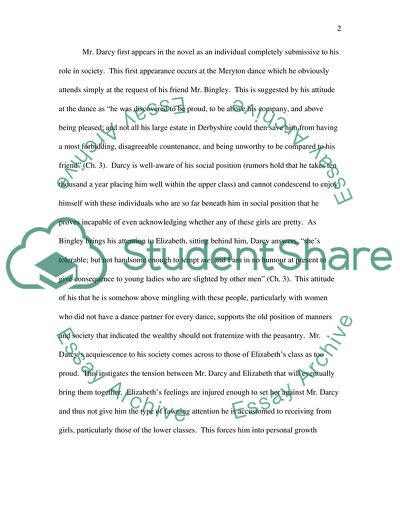
- Home
- Free Samples
- Premium Essays
- Editing Services
- Extra Tools
- Essay Writing Help
- About Us
- Studentshare
- Subjects
- Miscellaneous
- Mr Darcy from Pride And Prejudice
Mr Darcy from Pride And Prejudice - Essay Example

- Subject: Miscellaneous
- Type: Essay
- Level: Ph.D.
- Pages: 4 (1000 words)
- Downloads: 0
- Author: gisselle33
Extract of sample "Mr Darcy from Pride And Prejudice"
In both the real world and the fictional world of Austen’s creation, new roles for the people also meant a change in the rigid system of manners that had typified the upper classes. Austen illustrates this movement as wealthy merchants and sailors began to afford the properties of the decadent rich who began overspending despite their traditional idle lifestyles. As the story progresses, one can trace the development of characters such as Mr. Darcy as they make this transition within themselves. Mr. Darcy moves from a submissive member of his social class, to one more subversive to finally rebelling against the rules of his class in order to bring the book to its happy close. Mr. Darcy first appears in the novel as an individual completely submissive to his role in society.
This first appearance occurs at the Meryton dance which he obviously attends simply at the request of his friend Mr. Bingley. This is suggested by his attitude at the dance as “he was discovered to be proud, to be above his company, and above being pleased; and not all his large estate in Derbyshire could then save him from having a most forbidding, disagreeable countenance, and being unworthy to be compared to his friend” (Ch. 3). Darcy is well-aware of his social position (rumors hold that he takes ten thousand a year placing him well within the upper class) and cannot condescend to enjoy himself with these individuals who are so far beneath him in social position that he proves incapable of even acknowledging whether any of these girls are pretty.
As Bingley brings his attention to Elizabeth, sitting behind him, Darcy answers, “she’s tolerable; but not handsome enough to tempt me; and I am in no humour at present to give consequence to young ladies who are slighted by other men” (Ch. 3). This attitude of his that he is somehow above mingling with
...Download file to see next pages Read More
- TERMS & CONDITIONS
- PRIVACY POLICY
- COOKIES POLICY